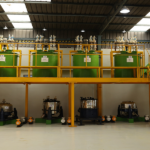
On Wednesday, Dec. 4, Ace Green Recycling, Inc., a provider of sustainable battery recycling technology solutions, and Athena Technology Acquisition Corp. II, a special purpose acquisition company, announced that they have entered into a definitive business combination agreement, pursuant to which a wholly-owned subsidiary of ATAC II will merge with and into Ace, with Ace becoming a wholly-owned subsidiary of ATAC II and Ace’s operations becoming the operating business of the combined entity.
The proposed business combination is expected to close in the first half of 2025, subject to customary closing conditions including regulatory, court, and shareholder approvals. Concurrently, Ace expects to complete financing from existing insiders and various strategic and fundamental investors.
“Ace is advancing electrification by building a global recycling technology to create sustainable supply chain solutions for critical metals that will enable next-generation technologies,” said Nishchay Chadha, CEO of Ace.
Ace’s battery recycling technology focuses on recovering critical battery materials from both lead and lithium-ion batteries. The company’s modular technologies are fully electrified, producing zero Scope 1 emissions, zero toxic water and zero solid waste. These capabilities allow Ace to provide hydrometallurgical recycling solutions without any smelting or thermal processes for both lead and lithium batteries.
Ace currently operates commercial facilities in India (lithium-ion; since 2023) that it owns and has licensed its technology to ACME Metal in Taiwan (lead; since 2024), with advanced plans to deploy its technology by building its own plant in the U.S. The company has proven its technology’s commercial credentials by enabling processing of more than three million pounds of lead and lithium batteries in India and Taiwan.
According to the company, Ace’s LithiumFirst technology can commercially recover up to 75% of lithium with a purity exceeding 99% from lithium iron phosphate (“LFP”) and nickel manganese cobalt (“NMC”) batteries. The technology also recovers NMC salts, graphite, iron phosphate, and other materials such as plastics, steel, aluminum, and copper by utilizing a closed-loop hydrometallurgical process that avoids pyrometallurgical operations and produces no liquid waste or Scope 1 carbon emissions.
technology can commercially recover up to 75% of lithium with a purity exceeding 99% from lithium iron phosphate (“LFP”) and nickel manganese cobalt (“NMC”) batteries. The technology also recovers NMC salts, graphite, iron phosphate, and other materials such as plastics, steel, aluminum, and copper by utilizing a closed-loop hydrometallurgical process that avoids pyrometallurgical operations and produces no liquid waste or Scope 1 carbon emissions.
Ace’s expansion strategy centers on the development of battery recycling plants in the U.S., creating centralized hubs for the sustainable recovery of valuable materials from end-of-life batteries. These plants are expected:
- Drive domestic job creation: Generate high-quality manufacturing jobs in the U.S., stimulating local economies and strengthening America’s workforce.
- Enhance critical battery material security: Reduce reliance on foreign sources of critical minerals such as lithium, cobalt, nickel, and lead, bolstering domestic supply chains and supporting the growth of the U.S. electric vehicle and renewable energy sectors.
- Promote renewable energy partnerships: Develop partnerships for renewable captive power with distributed power generators, further minimizing the environmental impact of operations.
Photo: Ace Green Recycling’s modular, lithium-ion battery recycling plant (PRNewsfoto/ACE Green Recycling).

On Wednesday, Dec. 4, Ace Green Recycling, Inc., a provider of sustainable battery recycling technology...